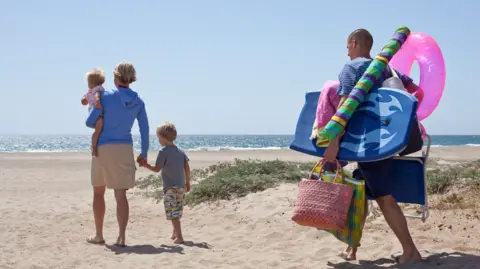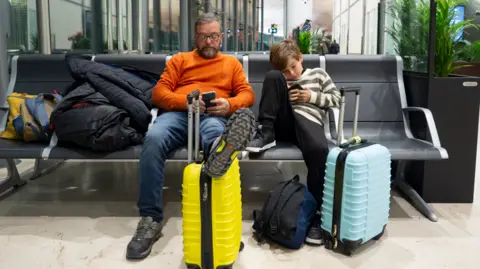When to book and where to stay: Six ways to save money on your summer holiday
 Getty Images
Getty ImagesPrices for all-inclusive family package holidays in some of the most popular desinations have soared over the past year.
But there are ways of saving money if you want to escape abroad. Here are six tips to help keep costs down.
1. Book early for July and August
The price you pay for your accommodation depends on when you book.
July and August are the peak months for summer holidays, not just for Brits but for people in other parts of Europe.
"If you've ever been to Paris in August there's hardly anyone there, everybody goes to the beach or heads for the mountains," says Sean Tipton, spokesperson for The Travel Association (ABTA), which represents tour operators and travel agents.
"That's when the hotels put their prices up," he says. Therefore, it is usually cheaper to book a holiday aboard for June or September.
If you do have to go during the peak months, Mr Tipton says: "It is generally a good idea to book it as early as you can.
"It can be a bit of a lottery because you can't 100% predict what the demand will be but as a rule of thumb in the majority of cases if you know you're travelling in July, August or over Christmas or Easter, book early."
2. Fly mid-week and early in the morning
 Getty Images
Getty ImagesThe best time to travel is the middle of the week, according to Mr Tipton.
"The weekend is the most expensive time to go because people prefer to fly over the weekend so if you fly mid-week it is generally cheaper," he says.
"Just simple little things like that get the price down."
The same goes for the time of the day you travel.
"It is common sense really," he says. "I don't particularly like getting up at 3am for a 6am flight and I'm not alone in that so those flights will be consequently cheaper."
3. Book a hotel room late
If you have some flexibility around when you can travel, there are some last minute bargains to be had.
Package holiday operators may have booked a lot of hotel space in advance which they may not have been able to sell as the holiday date approaches.
"They'll discount it just to make sure they get something for it," says Mr Tipton.
"Travel agents get sent notifications of last minute good deals so they're a good place to go if you've left it late and you want a good, cheap deal."
Another option is house-swapping. Instead of paying for a hotel or villa, people can register with an online platform which acts as a fixer between homeowners in different countries who want to stay in other's houses.
Justine Palefsky, co-founder and chief executive of Kindred, says that people who register with her site pay only a service and a cleaning fee.
For example, someone booking a seven night stay at a three bedroom house in Majorca would pay a $140 (£103) service fee to Kindred as well as $140 for cleaning before and after a stay in the house.
Jane Hawkes, a consumer expert specialising in travel, advises that holiday-makers go through a reputable site if they are choosing a house-swap.
"People need to be wary of social media ads at this time of year, advertising cheap holidays because scammers do tend to use those portals to show you images of a wonderful location.
"Then when you book it and do you bank transfer, you find it doesn't exsist," she says.
She recommends doing a reverse image search on websites such as Google to check the images haven't been lifted from somewhere else to promote a home that doesn't exist.
4. Pay in the local currency
Avoid changing money at the airport, says Alastair Douglas, chief executive at TotallyMoney, a price comparison site.
"Airports are normally the most expensive places to change cash," he says.
Instead, change your money well in advance.
Mr Douglas says that if people are worried about exhange rate shifting between booking a holiday and the date of departure they can "hedge their bets" by changing half in advance and half nearer the time.
However, he says that people don't really travel with lots of cash anymore. Most spending is done on cards.
This is a good thing, Mr Douglas says, because it will often allow you to select the local currency which is "probably the thing that will save you the most amount of money".
5. Weigh your bags
Even before you reach your destination, costs can pile up. Make sure you print out your boarding pass ahead of time.
"Some airlines can charge a lot of money just to print out at the airport," says Nicky Kelvin, editor at The Points Guy website. "Not all of them but just be safe."
If you're bringing a small suitcase on board the plane, bear in mind both the weight and the size of the luggage if you have to measure it in a metal sizer at the airport.
If it doesn't fit, you may be charged a fee to check it into the plane's hold.
Ms Hawkes recommends documenting the luggage dimensions an airline provides on its website just in case you have followed them but get to the airport and discover your bag does not fit.
"In that case, if the airline makes you put it in the hold and you've adhered to their website conditions, document everything and make a complaint after," she says.
6. Buy toiletries in advance
Food, drink and toiletries are often more expensive at the airport.
One of the reasons, according to Mr Kelvin, is because of the 100ml onboard liquid rule. While restrictions have recently been relaxed at airports in Edinburgh and Birmingham, it applies everywhere else in the UK.
One way to cut costs is to order your suncream or other toiletries online and pick them up in-store at the airport once you've been through security.
Some retailers allow you to do this, Mr Kelvin tells the BBC's Morning Live programme.
"So it's a double whammy - you're going to save because you're going to get the cheaper online pricing and you're going to avoid the security issue because you're going to pick up your big liquids after."
Another cost-saving tip is to take a water bottle with you. Most airports have free water refill stations.
He also recommends taking along your own snacks in lunch boxes, especially handy if you're travelling with children.
